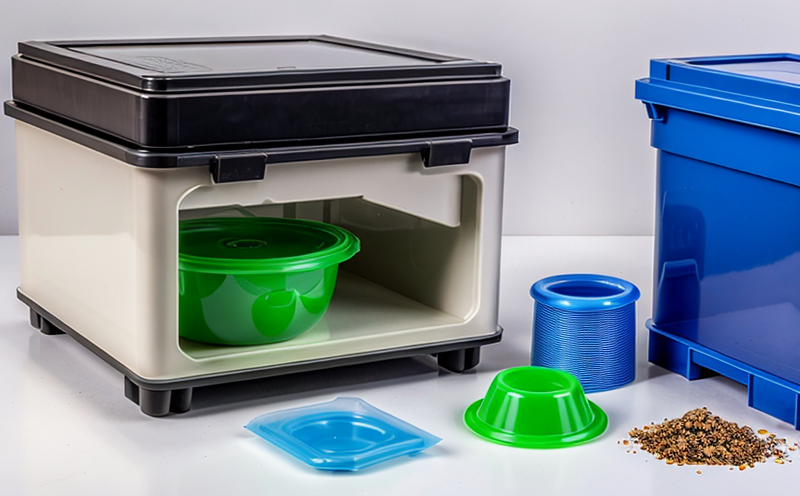ISO 527 Plastics Packaging Tensile Strength Testing
The ISO 527 series of standards provides a framework for mechanical testing of plastics. Among these, ISO 527-3 specifically addresses tensile testing methods for plastics. This service is critical in the packaging industry as it ensures that materials used in packaging are robust enough to withstand the stresses encountered during production, distribution, and use.
The focus of ISO 527-3 lies on providing accurate and reliable data about the tensile properties of plastics, which directly impacts package integrity. This is particularly important for flexible packaging films, bags, and containers where the material must remain intact under tension without compromising the product inside.
Tensile strength testing helps to determine how much force a sample can withstand before it breaks or deforms permanently. It is measured in units of stress (MPa) per unit area over which the force is applied. In the context of packaging plastics, this metric ensures that the material will not tear under expected conditions such as filling, sealing, and handling.
Accurate tensile strength testing allows for optimization of materials to balance cost, performance, and environmental factors. By using high-quality materials with appropriate tensile properties, manufacturers can reduce weight while maintaining or enhancing structural integrity. This is crucial in the packaging sector where lightweighting has become a priority due to sustainability concerns.
The testing process involves cutting a specimen from the sample material according to specific dimensions outlined in ISO 527-3. The specimen undergoes tension until failure, and the maximum stress it can withstand before breaking is recorded as its tensile strength. This data is essential for quality assurance processes and can inform decisions on material selection, design modifications, and process adjustments.
Understanding the behavior of packaging plastics under various conditions requires a comprehensive approach to testing. Tensile strength is just one aspect; other factors such as elongation at break, modulus of elasticity, impact resistance, and chemical resistance are also important. Together, these properties provide a holistic view of material performance that is vital for successful product development.
Our state-of-the-art equipment ensures precise and repeatable results, adhering strictly to ISO 527-3 guidelines. Our team of experts uses advanced software to analyze data and generate detailed reports, which are tailored to meet your specific needs. Whether you need basic compliance testing or in-depth analysis for R&D purposes, our services can support you effectively.
By leveraging the insights gained from tensile strength tests, manufacturers can improve product quality, enhance customer satisfaction, and stay competitive in the market. This service plays a pivotal role in ensuring that packaging materials meet regulatory requirements while also addressing practical challenges faced by businesses in this industry.
- Enhanced Quality Control: Identifying weak points early through rigorous testing enhances overall product quality.
- Cost Efficiency: Optimized material selection leads to reduced waste and lower production costs.
- Sustainability Benefits: Lightweighting without compromising strength supports environmental goals.
- Innovation Facilitation: Accurate data facilitates better decision-making in research and development activities.
Applied Standards
The ISO 527 series of standards is widely recognized for its comprehensive approach to mechanical testing methods for plastics. For tensile strength testing, the relevant standard used here is ISO 527-3: Mechanical properties of plastic materials - Part 3: Tensile testing. This standard specifies the procedure for determining the tensile modulus and tensile strength of plastics.
The detailed procedures in ISO 527-3 ensure consistency across different laboratories, making it easier to compare results internationally. The standard covers various specimen dimensions and loading conditions to accommodate different types of plastic materials. Compliance with these standards is crucial for manufacturers aiming to meet regulatory requirements and industry best practices.
Our laboratory adheres strictly to ISO 527-3 guidelines during every stage of the testing process, from sample preparation to data analysis. This commitment ensures that our results are accurate, reliable, and internationally comparable. Additionally, we stay updated with any revisions or amendments to these standards to provide you with the most current and relevant information.
By aligning our services with international standards like ISO 527-3, we ensure that your products meet global quality benchmarks. This not only enhances trust among customers but also opens doors for expanded market opportunities.
Industry Applications
The packaging industry relies heavily on tensile strength testing to ensure the integrity and performance of materials used in various applications. From flexible films to rigid containers, tensile properties play a crucial role in determining how these products will behave under different environmental conditions.
In the food packaging sector, tensile strength tests help verify that the barrier layers are sufficient to protect sensitive contents from external factors like oxygen and moisture. For instance, when testing multilayer films used for fresh produce, it is essential to confirm that they can withstand handling during transport without compromising the freshness of the product.
For pharmaceutical packaging, ensuring proper tensile strength is vital to safeguarding the integrity of medications throughout their shelf life. This includes verifying that blisters and sachets remain intact under various storage conditions.
In the recycling industry, understanding the tensile properties of plastic waste helps in designing effective sorting systems. Knowing how different types of plastics behave when subjected to mechanical stress allows for more efficient separation processes, ultimately promoting better recycling practices.
Our expertise extends beyond just compliance testing; we also support R&D efforts by providing detailed insights into material performance under real-world conditions. This enables packaging manufacturers to innovate and develop new products that meet both functional requirements and sustainability goals.





